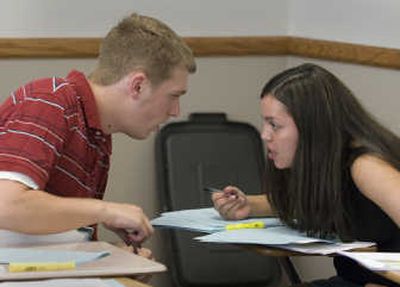Purely for the sake of argument

Gonzaga University’s nationally ranked team opened its season with a win Saturday, but there wasn’t a ball in sight.
Instead, the competition revolved around affirmative and negative arguments, cross-examination, and a rapid-fire manner of speaking that would leave the average listener convinced they’d stumbled into a school for auctioneers.
It was The Jesuit, GU’s annual debate tournament, and the school’s top team of seniors Grace Saez and Nick Bormann – considered among the top pairs in the country – was opening the season that they hope will lead them to the Sweet 16 come March.
“It is sort of exciting,” Bormann said of the high expectations surrounding his team. But they haven’t achieved the kind of campus celebrity of, say, former Zag guard Derek Raivio. “We don’t get a lot of publicity,” he said.
The Jesuit includes 52 teams, mostly from around the West, and will run through Monday. It operates on a round-robin format for two days, with the top 16 teams competing in a bracket-style tournament Monday.
Coach Glen Frappier has high hopes for this year’s team. Each of the past 12 years, GU debaters have been invited to the national tournament in March. The school’s national rankings in debate have been as impressive as the basketball team’s, and sometimes more so. Historically, GU debaters have been making it to nationals since 1947. Former Speaker of the House Tom Foley was on that team.
Last season, GU’s overall team ranked 11th. “This year, we think we’re going to crack the top 10,” Frappier said.
Like big-time college sports, debate coaches recruit the best high school students they can, attending tournaments and building relationships with students and parents. Frappier said that GU’s coming off its best two recruiting years ever.
“It’s really analogous to a sport,” he said. “We start recruiting kids when they’re sophomores in high school.”
Saturday’s debates unfolded at GU’s administration building, with the teams arguing whether the U.S. should provide certain forms of aid to Middle Eastern countries. In the first round, Bormann and Saez argued against the proposition that the U.S. should provide more food aid to Lebanon, saying that free-market forces would be better tools to improve the lot of that country’s poor.
“We were very libertarian this round,” Bormann said.
The debaters speak so quickly that it’s difficult to follow at first. Each side gets four timed speeches, and they want to make the most of it. Still, it’s striking to hear – the students speak so fast they have to take loud, periodic gulps of air to keep the furious rush of words moving.
“There are time limits in debate, and people want to get in as many points as possible,” Frappier said. “People who’ve never been exposed to this style of debate have the same reaction: ‘How do you understand a word they’re saying?’ “
Many top college debaters have been at it since high school, and it’s become more natural to speak that way – and to understand their opponents.
“After the first year and a half, two years, you kind of get attuned to it,” Bormann said.
Bormann and Saez were one of eight teams invited to the University of Kentucky debate tournament in early October – teams usually considered the best in the country. They say they’re hoping to make it into the round of 16 at the national tournament in the spring.
Saez started debating in high school in Las Vegas. She’s considering law school – a common choice for debaters – or coaching a debate team after she graduates.
“It’s really educational, and I like the competitive aspect,” she said.
Bormann grew up in Spokane and attended G-Prep. He’s also considering law school, along with other post-graduate options.
He said he spends four to five hours a day preparing for debate. Which is more than he can say about his regular class work since school started a couple weeks ago.
“I haven’t done any homework yet,” he said.